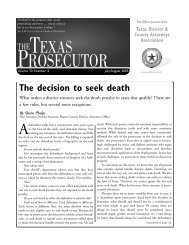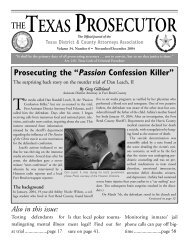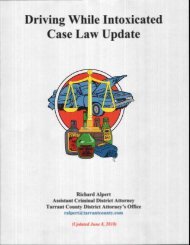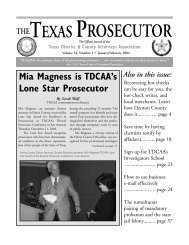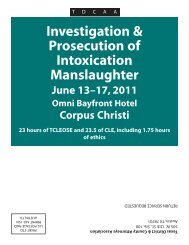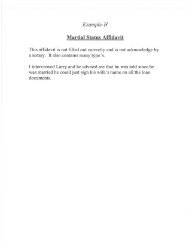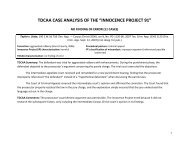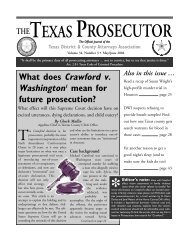Driving While Intoxicated Case Law Update - Texas District ...
Driving While Intoxicated Case Law Update - Texas District ...
Driving While Intoxicated Case Law Update - Texas District ...
Create successful ePaper yourself
Turn your PDF publications into a flip-book with our unique Google optimized e-Paper software.
efusing or of giving a sample for someone under 21. There was no evidence that the police<br />
officer'sfailure to read the warnings had any impact on her consent, especially since the defendant<br />
was provided with the written warnings.<br />
13. URINE SAMPLE<br />
(a) MAY BE REQUESTED<br />
Hawkins v. State, 865 S.W.2d 97 (Tex.App.-Corpus Christi 1993, pet. ref'd).<br />
In holding that it was proper for the officer to ask for a urine specimen, the Court points out that the<br />
implied consent statute specifically allows a person to consent to any other type of specimen.<br />
Police officer may request urine specimen instead of breath or blood, even though statute<br />
specifically recognizes only breath and blood tests.<br />
(b) rs ADMTSSTBLE WTTHOUT EXPLATNING RTGHT TO REFUSE<br />
Harrison v. State, 205 S.W.3d 549 (Tex.Crim.App. 2006).<br />
Defendant was arrested for DWt and after having the DtC-24 read to her agreed to give a breath<br />
sample which showed no alcohol. She was asked to give blood and agreed as well and was<br />
transported to hospitalfor blood draw. Afterfive orsxsomewhat painful attemptsto get blood, she<br />
was asked if she would give urine instead, and she agreed so as to avoid continuing to be stuck<br />
to obtain a blood sample. The urine sample showed controlled subsfanceg and the defense<br />
attacked the urine sample on the basis that the officer did not warn her that she did not have to give<br />
a sample and her refusal to give urine would not result in a license suspensrrcn. The Court of<br />
Appeals found that the consent to give urine was not voluntary as it was given to avoid the further<br />
pain of a blood draw. The Court of Criminal Appeals found that there was no requirement that any<br />
warnings be read before asking for consent to a urine sample and upheld the trial court's finding<br />
that the consent was voluntary.<br />
H. NOT NECESSARY TO SHOW 210 LITERS OF BREATH<br />
Wagner v. State,72O S.W.2d 827 (Tex.App.-Texarkana 1986, pet. refd).<br />
Not necessary to show that 210 liters of breath were used in the tntoxilyzer test.<br />
I. BREATH TEST NOT COERCED<br />
1. EXTRAWARNING REFERRED TO CONSEQUENCES OF PASSING NOT<br />
REFUSING<br />
Bookman v. State, 2008 WL 31 1271g (Tex.App.-Waco, 2008, reh. overruled).<br />
ln hotding that the officer's statement to the defendant regarding the breath test "that if the<br />
defendant passed, the officer would let him go," did matke the defendant's consent involuntary. ln<br />
13



